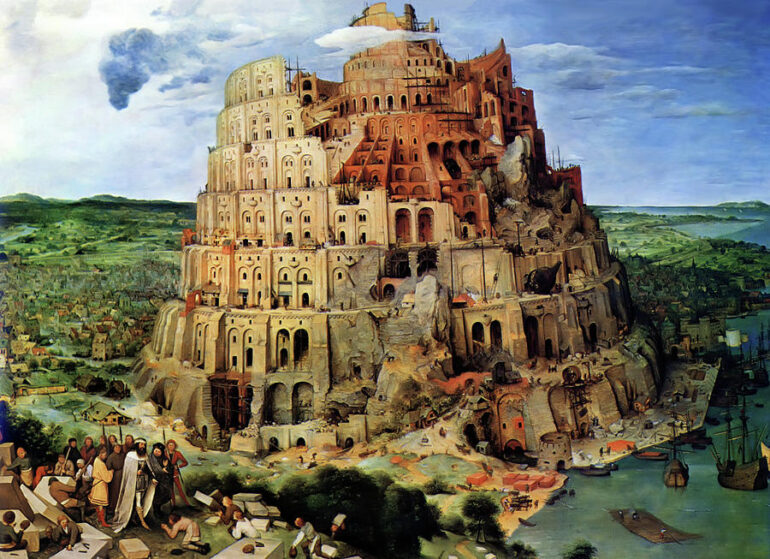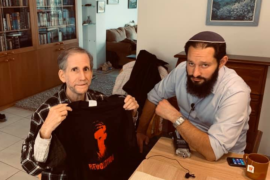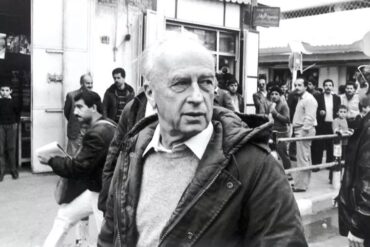Can Israel challenge the uniformity & homogeneity of bourgeois liberalism with a unique vision of Hebrew Universalism that allows for separate identities to fully express themselves in such a way that’s actually healthy for the greater collective?
Transcript:
Tov, erev tov. What we’re going to be speaking about today is a continuation of the idea of Hebrew Universalism that I spoke about a few times in the last month and a half. A couple of you were here you, I don’t recall.
I want to begin by talking about something I saw, a movie, a little movie I saw on Facebook the other day. This movie was actually, it was a little cartoon, it was cute. And in this cartoon you have one guy. It was like this, the rational, atheist, secular, humanist and he’s talking to – at the beginning – to this one woman who is a theist – that’s the way it’s depicted – and he starts to argue with her.
And she starts to say no, you know, there’s a God, and you know, maybe one day you’ll see it to. You know, we all have a personal relationship with this God, and another guy pops up, another girl pops up, another guy pops up and they all say yes, we have this great relationship with God. All going great.
There’s about 10 people on the theist side, and then all of a sudden, one of them starts to talk about “Yes, and you have to believe in Yushka, the Savior” and it becomes a Methodist.
And then someone else pops up and says, “What do you mean? Jesus, peace be upon him was a prophet, he’s not God” and that becomes a Muslim.
And basically, this starts to get more and more complicated with all these different theists all of a sudden becoming members of a different national-slash-religious groups. There’s a Jew, there’s a Buddhist, there’s a Hindu, there’s a Baptist, there’s a Catholic, there’s a Muslim, and they all start to fight each other.
And then one pulls out a gun, he says, “Why did your God tell you to take my land?” And then the Jew pulls out an F16 and fights him in this little cartoon.
You guys get the point.
The atheist, from the beginning, he sits back and he says, “Wait, guys, let’s be rational. Two plus two is four, no matter where you are. There’s certain rational facts, there are certain logical, rational facts that we have to accept. And you guys should be accepting them as well. We’re all human.”
And slowly the people start to become – instead of being a Muslim and a Baptist and a Presbyterian and a Catholic and Buddhist and Hindu, their signs start to change to become human.
And then, just before the clip ends, of course, I think it was maybe the Mormon guy that said, “But wait! I want my own planet after I die,” and then the fight starts to break out again and then it’s over. And the message, though, of the movie is clear. What’s the message of the movie?
It’s kind of like the – have you guys heard of John Lennon? You know, who John Lennon is? Imagine. Imagine all the people, imagine there’s no nations, imagine there’s no religion. Imagine that there is no difference between us, we’re all just human, we’re all just the same. We’re all just one. It’s this kind of oneness. There’ll be peace, right? So what I want to talk about today is the idea of Hebrew Universalism, about why that solution is wrong. Why that solution is problematic. Why that solution actually hides inside of it a kind of hate and why Hebrew Universalism actually offers an alternative to what we find in all of the world – primarily in the West – this idea that deep down, we’re all humans. Which is true, I mean, human beings are human beings, but that we have to – if we accentuate our differences, that we’re actually in a constant state of war.
Now, that’s true, there’s something true in that, and now what I want to bring you back to – I want to take you guys back to the beginning of the Jewish people… I want to take us back to the beginning of the Jewish people, to another generation that thought the same thing that this little movie clip on Facebook thought, that thought the same thing maybe that John Lennon thought in his song, Imagine. And that is the generation that built the Tower of Babylon.
The generation that built the Tower of Babylon was all about us erasing our differences. We have to understand that that idea of erasing our differences, our national differences, our… our collective identities – it didn’t come in a vacuum. It came in something very, very powerful, and very real. It came after a trauma.
What happened just before the Tower of Babylon was the flood. What was the cause of the flood? The cause of the flood was the m’leah ha’aretz hamas, that there was violence and battling between human beings. And when we look at our sages, about how our sages describe the Tower of Babylon, they describe the Tower of Babylon and as kind of a… an attempt to solve the problems and to save us from the same fate as this tremendous, traumatic experience.
When I think about it today, and I think about what’s happening in Europe, and I think about the United States and the West and how it’s dealing with… trying to deal with its hegemony in the world… We also have to take into consideration that Western civilization – it too is living in the trauma of a generation of the flood.
What was that generation of the flood where the violence broke out and there was war and the differences between peoples caused tremendous bloodshed? World War I. World War II. The Holocaust. Nationalism is evil. Nationalism can be evil and it can cause this tremendous battle, racism.
We’re living in the shadow – it’s like we’re living in the generation that’s the generation of the Tower of Babylon, that’s trying to correct and… and remembering the trauma of the generation of the flood.
So open up to Genesis 10:31 – בראשית י’ ל”א. And by the way, the background of this, why is it going to be so important? Because Chazal, our sages – it’s very important for them to point out that there’s going to be a different solution. The Hebrew Universalist solution to the idea of the Tower of Babylon, represented by none other than Abraham, Avraham Avinu. He comes on the background of the Tower of Babylon.
So let’s open up to 10:31 (בראשית י’ ל”א).
“Ele b’nei Shem l’mishp’hotam l’l’shonotam b’artzotam l’goyehem.”
“Ele b’nei Shem l’mishp’hotam”: These are the children of Shem according to, first of all, their families – mishp’hotam.
L’l’shonotam: To their lashon, to their tongue.
B’artzotam l’goyehem: In their lands, according to their nations.
What we’re witnessing here is the transformation of humanity from the stage of families to the stage of nations. And as we pointed out before with a family, the natural state of affairs between families is one of, you know, we help each other out, love, we bring each other gifts on Purim, we marry into each other, we have each other over for dinner. That’s a family.
But then, l’shonotam b’artzotam. What unifies the mishpahot is lashon. What’s a lashon? L’shonotam. What’s l’shonotam mean? What’s it translated as in English? I’m curious. Language. That’s wrong. Because there’s – it actually may be correct, but l’shonotam should be tongue.
The other word for language – how do we say language in Hebrew today? Safa. Safa is on the outside, it’s your lip. Lashon is on the inside, your tongue. The outside is the words we say. What is the internal content of what we say? That’s our culture and our identity. The families have their own individual identities.
But what happens, then, is that they are in territory – b’artzotam – and the minute that they accept a specific territory, what happens when they’re in a territory? They become l’goyehem. They become goyim, right?
What is a goy? A goy is a nation, and as the prophet says, lo yisa goy el goy herev: in the future to come, there’ll be a time where nation will not lift up sword against other nation. Because what is the natural state of affairs if you have a nation with its own individual culture and its own territory?
It’s that that nation is at war with the other nations. That is the common concept of nationalism, especially in the wake of World War II, in the wake of the Holocaust, that people carry with them, right? If I’m at – what is nationalism? Rav Kook also writes about this extensively. That, in general, nationalism is nothing more than an extended form of egoism.
I’m about me, my ego, and I’ve just expanded my ego to encompass those who are like me. Against whom? Everyone else. And in fact, we see that basically, what is a goy? A goy is a microcosm of humanity, like we see it in the ancient Greeks, where they called everyone else barbarians. “Bre bre bre bre bre,” they spoke – they were strangers. The stranger, what is a stranger? If you have a nation, the stranger is a potential enemy.
And we see this among nations, us against them. French, because the Germans. And that is the state of affairs that we’re in. Now, this is a problematic thing. Here, it says, “v’elu mispahot b’nei noah,…” And this is the state of affairs after the flood. There are these nations, now this fight between people, this hamas, this violence that took place between people that caused the flood, is still in existence. And even though we were promised there would never be another flood, now look what happens.
The next chapter in י”א: “va’y’hi kol ha’aretz safa ahat u’d’varim ahadim.” What is “safa ahat”? Basically, what are we saying here? Now, there’s an attempt, this is the beginning of the attempt of the Tower of Babylon to correct the error of the violence. What is the fundamental assumption? The fundamental assumption is that so long as we are different, we’re in constant battle with each other. We’re at war with each other. We’re fighting each other.
And that makes sense. And we see that in reality. Someone’s different from someone else, a nation’s different from another nation. “Yisa goy el goy herev”: nation will lift up against nation a sword. There’ll be fighting and war.
So now it comes, this ingenious idea that’s called the Tower of Babylon. What is the idea of the tower Babylon? It’s a solution to this idea that that we succumb to this violence. How are we going to defeat the violence if the violence is born because we’re different, because we have different identities, 70 nations? What do we have to do? We have to wipe out those differences, we have to have uniformity.
And now we see that the idea of building the Tower of Babylon was an ingenious idea. And indeed, according to our sages, who was in charge of building the Tower of Babylon? Nimrod. Nimrod was a great man because he knew the creator and he rebelled against him on purpose. Why? Because he wanted to save humanity, he wanted there to be peace.
The underlying concept was, we want to have peace. How are we going to have peace? Let’s see how we start to build it:
“V’y’hi kol ha’aretz safa ahat u’d’varim ahadim.” You see that in chapter 11. That all the land is now one language. We’re going to talk one language – safa – from outside. Safa – the lip, one lip.
“U’d’varim ahadim” – how is that translated in English? Unique words. Okay. There’s many different explanations of what that means in Hebrew. It says “d’varim ahadim.” One of the explanations is that they were all talking about one. About how to become one.
“D’varim ahadim.” How are we going to become one? Now watch what happens, I’m jumping to verse three. “V’yomru ish el re’e’hu hava” – hava! What are they saying to one another? Hava – you’ve heard of hava nagila, right? What is hava nagila? It’s a dance. We dance at bar mitzvahs and weddings. Hava nagila – everyone together now, let’s rejoice. Hava means everyone together now.
How are we correcting this? Everyone together. Oneness, uniformity. We’re all going to be the same.
Hava, hava. And what are we going to do? We’re going to build bricks and burn bricks. What’s a brick? Brick is an artificial rock. It’s a symbol of technology. What’s happening here? The title of Babylon is this never-ending endeavor of humanity to use technology to build a world based in “materialness,” material desires. Where all of humanity can become a part of it.
It’s like, basically, mass consumerism.
We’re all going to be the same. We’re all going to be – we’re all human. We’re all one. We’re all uniform.
Because the differences between us cause us to hate each other. And if we hate each other, there’s going to be war. And if there’s war, there’s not peace, and peace is good. Makes sense. But what’s the problem with this? What’s the problem with this solution? The problem with this solution is very simple.
By making us all uniform, you’ve basically murdered all of us, you’ve murdered our individuality, our individual collectiveness, you’ve made us all slaves of – that we’re going to build this tower, this never-ending tower and make a name for ourselves. We’re the center of everything. This kind of pride, arrogance, in human technology, in human building.
Because what happens is that in our differences – what are you really saying to someone when you say, “How can we get along? How can we love each other? How can different nations, different peoples learn to love each other?” What’s the solution of the Tower of Babylon? That we don’t be different. What are you really saying, then? What kind of love is this?
This is actually hate. You understand what I’m saying? What we’re actually saying when you say that we all have to be uniform, that we’re all human, that we’re all the same. What are we saying? Is that if you’re different, I can’t bear you, I can’t stand you.
We all have to be the same.
So we have a problem. We have a problem because on the one hand, if we’re different nations, if we’re 70 nations, the state of affairs – which we said is a state of war – was no good.
But the option of the Tower of Babylon is: let’s wipe out our differences and all become one. Uniformity. But that’s no good because that destroys our differences.
And it’s here that we wait – we’re waiting for a solution.
And here is the place where Hebrew Universalism was born.
But just before that, I want everyone to look at chapter 10, verse 10, because even though Avraham Avinu is going to be the answer to the Tower of Babylon, there was another answer before. Okay, I’ll start from verse nine – Chapter 10, verse nine. We’re talking about Nimrod, who is the initiator of the Tower of Babylon, according to Chazal, our sages. He was a man of hunting – “hero before HaShem… and his kingdom was Babylon.” That’s how we know that Nimrod was the one who was in charge of this whole project of building the Tower of Babylon. To make peace, to eliminate our differences, to erase our differences so we can forget our uniqueness, our individuality, so that there wouldn’t be war. Makes sense. Imagine. Imagine all the people. We’re all one.
And then I jump to verse י”א – verse 11. Now someone ran away from Babylon. Who is this that ran away from Babylon? Ashur, the father of Assyria.
But what does he do there? And really, in fact, our sages say that Ashur was a tzaddiq. He was a righteous man, because he saw what was going on the Tower of Babylon, and he wanted to put an end to it. He didn’t like this plan.
Now, what’s the problem though? What did Ashur do? He goes away from Babylon, and his next step is not to solve the problem. What does he do? What does he build? He builds Nineveh. In other words, what does he build? Babylon number two.
That’s the tendency we have, if there’s an imperialist tendency – when a nation comes and says, I want everyone to be the same. What are they saying? I want everyone to be just like me. We see it again and again. European colonialism. The French Revolution begins as a revolution for equality and fraternity and equality and liberty. 20 years down the road, what happens? Napoleon becomes imperialist.
The rejection – and this is going to be our problem – the rejection of this Babylonian imperialism – of wiping out the differences between everyone – is too often, in fact, another form of imperialism.
Today, what kind of imperialism do we have? What kind of cultural imperialism do we have? The United States – America, right? This idea of multiculturalism. What is multiculturalism? Are we really all different in multiculturalism?
No. I mean, if you walk around the streets of New York, what are we actually? Everyone’s basically Americans, and some people, you know, get drunk on St. Patrick’s Day, and some people celebrate Chinese New Year, and some people eat at a Jewish delicatessen.
But really, there’s a common denominator of what kind of human you are. American. That’s okay.
United States, for example, has a conception that all the world, deep down, they really are, in fact, good Americans.
Some have seen the light and are already Americans in actuality, right? They watch NBA basketball, and they drink Coca Cola and they wear Nike shoes, and they want to send their kids to a good college and they love democracy.
And some human beings are Americans deep down, but they just don’t know yet. So what are we going to do? Well, we can – we’ll have war with Saddam Hussein in Iraq, remove the dictator and then everyone will be going in the streets and watching NBA basketball and sending their kids to good college and democracy, right? Except what’s the problem?
That that happened. When Saddam Hussein was removed, what happened? All of a sudden you see that there’s different human identities. There’s different tribal collective identities. There’s the Shiites and the Sunni and the Kurds. There’s different ways of being a human.
The assumption that we’re all human – like in the movie that I mentioned at the beginning – is an imperialist – is a form of cultural imperialism. Because what they’re saying is, “I know how to be human, and I’m going to impose my identity upon you. But I’ll teach you how to be human. This is the way to be human.”
That’s Babylon. And that’s Nineveh. Wiping away our differences, erasing our differences with the assumption that the only way we can love each other truly is if we’re all the same.
What we have to see is that the way to love each other truly is to recognize our differences. Because only if I recognize that you have a unique human identity, you have a unique culture, you have unique fundamental ideas about man and creation and the world and the future and history. You’re a different type of human than me. And I respect that. I might not – I might disagree with it, but I respect that we have these differences, then there’s a chance for real love.
But if I can only love you because you’re just like me, what I’m actually saying is I hate you.
So that’s what happened with Assyria and now we need the solution. We need the solution, right? We have 10 minutes for a solution.
Who comes onboard right after – (question)… one of the rebellions to Nimrod – the rebellion to the rebellion. Nimrod built the Tower of Babylon to rebel against HaShem – we’ll make our own name, we’re going to make our own artificial reality. We’re going to worship technology and materialism. And we’re going to be the same because we’re gonna be so busy building this tower that we’re going to forget who we are, we’re gonna forget that we’re different.
We’re gonna be so busy playing with our iPhone, we’re going to forget that we’re different. Because we’re all really the same, right? That’s a form of cultural imperialism and what did Ashur say? Is that I’m going to break away from that because I don’t like that, but he does – goes away, breaks away, and does the same thing.
That’s what I was explaining.
(question)
So – absolutely. Differences now are what’s called am segula. What happens here? Let’s go back to the Tanakh and we’ll see that this comes to the answer. It’s very important for Chazal, for our sages, to present Avraham Avinu – Abraham – on the background of the Tower of Babylon. Chronologically it might not work out, but it’s very important for it to be presented that way because Avraham is going to be the antithesis to the Tower of Babylon.
And, in fact, we have stories where he was involved in the building of the Tower of Babylon at the beginning, because – what – the Tower of Babylon was actually an idealistic endeavor, to say – if you manage to make peace. So Avraham Avinu – in order to understand him and his mission and Hebrew Universalism, what’s the idea? Look at chapter י”ב, chapter 12, verse one. “HaShem says to Avraham, ‘Go forth from your land, from the place of birth, and the house of your father to a land that I’m going to show you’” and now what’s the solution? What am I going to do? “I’m going to make you into a nation.”
Okay, the solution is not going to be to wipe out the differences, the national, cultural differences between the different human identities. The answer is going to be to make a 71st nation – the nation of Israel – that is going to be hated by everyone. From “m’ever” – the Hebrew, that he’s on one side of the world and everyone else is on the other side of the world.
“And by making you into a nation…” What’s going to happen? “And I’ll bless you and I will make your name great and you will be a blessing and I will bless those who bless you and I’ll curse those who curse you and shall be blessed in you…” – what does it say in the translation? – “…the earth shall bless themselves by you.”
Now what it says in Hebrew is not “the earth” but “the families.” In other words – we said at the beginning, we talked about the fact that there was a transition of the nations to change from being families into nations. This natural state of affairs between families is love. The natural state of affairs between nations is war. And what is the mission of Avraham? HaShem says to Avraham, I’m going to make you into a nation – nation number 71 – and when you become a nation, then the nations of the world will transform back into families.
What does “niv’r’khu” mean? It doesn’t mean to be blessed. “Niv’r’khu” is actually the word for what we do with the vine, a grapevine. You stick it into the ground and a new vine shoots up. In other words, there’s this – that’s the action of brakha (ברכה). By the connection of the nations of the world with Avraham – that’s going to be a solution. What we’re going to find is that the solution is not going to be – the solution to war is not going to be uniformity, which we have to be very careful of: the idea of cultural imperialism, making everyone the same. And we want to make all the nations of the world be just like us, even if, subliminally, that’s what we want to do. Like European colonialism, like American global action.
Now, you’re going to be your own nation, and by you – through you – the nations of the world are going to come back. So actually, we can see, if you look at Zekharia י”ד, chapter 14 – י”ד, ט”ז – chapter 14, verse 16. Zekharia is talking about the future times. And what does he say, the prophet Zekharia? “That is which is remains of all the goyim that came upon Jerusalem… and they will come up every year to worship HaShem on the holiday of Sukkot. And those who did not come up from the mishpahot -” in other words, there was a transformation from the nations back into families and that’s what’s left. That’s what’s called notar ha’goyim – what’s left of the goyim is that they’ve become, now, families.
So what I want us to see here – we only have a couple minutes left – and there was actually much more I wanted to explain about this. But what we looked at is the idea that when human identities are different – 70 nations of the world – there’s war. One of the human inclinations to try and eliminate war – the idealistic inclination – to make peace, is to erase our individual identities. Imagine. John Lennon.
And that’s what’s been transformed as Universalist. Today’s Universalists. Let’s make us all into the same. You can be a Universalist in a religion, Universalist in the cultural sense. Let’s make us all the same.
Hebrew Universalism comes with a unique idea.
And the idea is that the Jewish nation has a task – as a nation – and the task of nation is not to wipe out the differences between these different human identities, but rather to find a focal point where each of these different identities can really be different, but can be united.
And that’s the idea of Zion. Zion means the focal point, that’s what it’s about, the final focal point. And in that sense, now, I want you to understand that Jewish nationalism, in that sense, is possibly the only really kosher form of nationalism. Why? Because if all nationalisms of the world are, in fact, a form of extended egoism, I wanted – for me – good, and now I’ve expanded it to my collective “me” against you, us against them, we find that the foundation of Jewish nationalism, as expressed in Avraham Avinu – the idea of tikkun olam – of fixing the failure of the Tower of Babylon, where we were all dispersed. Uniting us all back together. And the deeper that one digs into Jewish nationalism, the more of a Universalist you are. But there’s a lot more to say about what kind of universalism, and there’s a lot of – actually – different plans. Avraham has one plan about how to be a Hebrew Universalist. Nahor, his brother, has a different plan about how to be a Universalist. Avraham at the beginning has a different plan than what he has at the end, and there’s much more we could talk about, but we’ll save that, b’ezrat HaShem, for the next time.





